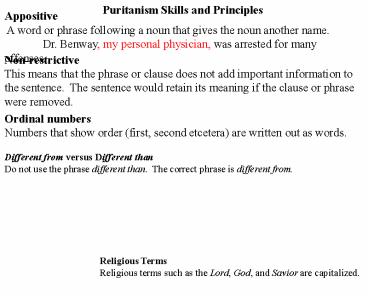Appositive - PowerPoint PPT Presentation
1 / 4
Title:
Appositive
Description:
... the phrase or clause does not add important information to the sentence. ... a comma after them; however, it is correct to use one in these cases if you wish. ... – PowerPoint PPT presentation
Number of Views:101
Avg rating:3.0/5.0
Title: Appositive
1
Puritanism Skills and Principles
Appositive A word or phrase following a noun
that gives the noun another name. Dr. Benway, my
personal physician, was arrested for many
offenses.
Non-restrictive This means that the phrase or
clause does not add important information to the
sentence. The sentence would retain its meaning
if the clause or phrase were removed.
Ordinal numbers Numbers that show order (first,
second etcetera) are written out as words.
Different from versus Different than Do not use
the phrase different than. The correct phrase is
different from.
Religious Terms Religious terms such as the Lord,
God, and Savior are capitalized.
2
The Prefix Self The prefix self- always has a
hyphen after it.
Sequence of Verb Tenses In a sentence with two
clauses, the verbs must show simultaneous
occurance or sequence of occurance. If one verb
is in the past and another verb occured before
it, the verb that occured first needs to be in
the pluperfect or past perfect tense (using the
helping verbs had, has etcetera). Because she had
murdered him, Myron did not come to Sally's
party. NOT Because she murdered him, Myron
did not come to Sally's party.
Commas in Addresses When writing an address, a
comma comes between the city and state or city
and country.
Commonly Confused Words Advice versus
advise Advice is a noun--a thing that someone
gives. Advise is a verb--something someone does.
3
Sentence fragment A sentence fragment is a group
of words punctuated like a sentence that is not a
complete thought. In formal writing, sentences
should express complete thoughts. A sentence
fragment can also be a sentence missing a subject
or predicate. Correct sentence fragments by
connecting them to sentences or by creating
sentences with additional words.
Spelling Irregular Plural of Wife The plural of
wife is irregular. It is not wifes rather, the
word is wives.
Run-on Sentence Fused sentence Run-on sentences
happen when there are two independent clauses not
separated by an incorrect form or any form of
punctuation at all. When there is no punctuation
between sentences, the error is also known as a
fused sentence. The error can be corrected by
adding a period, semicolon, or colon to separate
the two sentences.
Everyone Everyone is singular so it is replaced
by a singular pronoun (he, she, him, it, his,
her, its and so forth) and takes a singular verb.
4
Use of a Semicolon and a Comma with a Conjunctive
Adverb When there is a conjunctive adverb (or
adverbial phrase) in two sentences connected
with a semicolon, the adverb (or phrase) is
connected to the second sentence and thus must
follow the semicolon. Since it is an
introductory word or phrase, conjunctive adverbs
are followed by a comma.
Punctuating Titles Put quotation marks around the
titles of essays, short stories, poems, one-act
plays, songs, newspaper articles and magazine
articles. Underline or italicize the titles of
book-length works, book-length poems, full-length
plays, album or cd titles, movie titles and names
of newspapers and magazines.
Introductory Prepositional Phrase When you have a
prepositional phrase that begins a sentence and
it is more than three words, you must use a comma
after the phrase. Prepositional phrases of less
than four words do not have to have a comma after
them however, it is correct to use one in these
cases if you wish.































